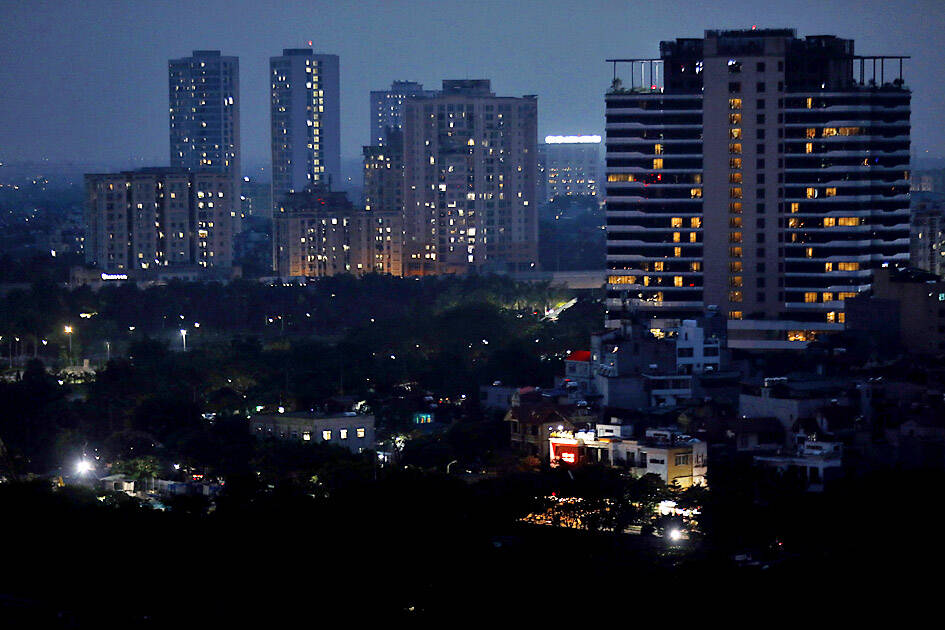Vietnam’s northern province of Bac Giang, home to suppliers for Apple Inc and other global electronics companies, has promised daytime power to factories as blackouts sweep the nation.
Outages have hit industrial parks in some northern provinces including Bac Giang and Bac Ninh, state utility Vietnam Electricity Group’s northern unit has said.
Canon Inc’s factory in Bac Ninh Province faced an outage from 8am on Monday to 5am yesterday, the unit said.

Photo: EPA-EFE
Further disruptions to electricity supply are probably unavoidable as demand overloads the power grid, the utility said.
Soaring power usage in northern Vietnam is expected to continue this month amid intense heat, it said.
Bac Ninh Communist Party Committee Secretary Nguyen Anh Tuan ordered officials to come up with a plan to minimize factory blackouts, particularly for electronics and food processing plants, the Tuoi Tre newspaper reported.
Meanwhile, Bac Giang would secure “uninterrupted” electricity for factories between 7:45am and 5pm starting yesterday, according to a posting on a provincial news Web site, citing a meeting of local officials after the blackouts disrupted production.
The province would prioritize power to households at night.
Bac Giang’s power distribution plan is to run for 20 days and it would be adjusted should the situation change, the report said.
Factories in the nation’s export-dependent economy so far have not complained about a lack of power, Vietnam Association of Foreign Invested Enterprises head Nguyen Mai said.
Many global companies, particularly electronics makers such as Samsung Electronics Co and those with large operations such as Formosa Ha Tinh Steel Corp (台塑河靜鋼鐵興業), have their own sources of electricity, he said by telephone.
Nonetheless, some plants have experienced power shortages, Vietnamese Deputy Minister for Industry and Trade Do Thang Hai said during a weekend briefing, without elaborating.
Most cities and provinces have issued directives to save electricity, resulting in a reduction of about 2.5 percent of daily consumption, Hai said without giving the time frame.
Searing summer temperatures and reduced water levels in hydropower reservoirs are straining Vietnam’s power grid. Thousands of factories have been forced to curb consumption and officials have implemented planned blackouts.
Policymakers are now scrambling to find ways to boost the electricity supply, either by quickly clearing completed renewable projects or bringing in liquefied natural gas imports for the first time.
Bac Ninh People’s Committee Chairman Le Anh Duong urged companies to arrange shifts for the efficient use of power.
Companies with urgent orders should seek their industrial park’s approval to operate extra shifts from midnight until 5am, he said.

Semiconductor business between Taiwan and the US is a “win-win” model for both sides given the high level of complementarity, the government said yesterday responding to tariff threats from US President Donald Trump. Home to the world’s largest contract chipmaker, Taiwan Semiconductor Manufacturing Co (TSMC, 台積電), Taiwan is a key link in the global technology supply chain for companies such as Apple Inc and Nvidia Corp. Trump said on Monday he plans to impose tariffs on imported chips, pharmaceuticals and steel in an effort to get the producers to make them in the US. “Taiwan and the US semiconductor and other technology industries

A start-up in Mexico is trying to help get a handle on one coastal city’s plastic waste problem by converting it into gasoline, diesel and other fuels. With less than 10 percent of the world’s plastics being recycled, Petgas’ idea is that rather than letting discarded plastic become waste, it can become productive again as fuel. Petgas developed a machine in the port city of Boca del Rio that uses pyrolysis, a thermodynamic process that heats plastics in the absence of oxygen, breaking it down to produce gasoline, diesel, kerosene, paraffin and coke. Petgas chief technology officer Carlos Parraguirre Diaz said that in

SMALL AND EFFICIENT: The Chinese AI app’s initial success has spurred worries in the US that its tech giants’ massive AI spending needs re-evaluation, a market strategist said Chinese artificial intelligence (AI) start-up DeepSeek’s (深度求索) eponymous AI assistant rocketed to the top of Apple Inc’s iPhone download charts, stirring doubts in Silicon Valley about the strength of the US’ technological dominance. The app’s underlying AI model is widely seen as competitive with OpenAI and Meta Platforms Inc’s latest. Its claim that it cost much less to train and develop triggered share moves across Asia’s supply chain. Chinese tech firms linked to DeepSeek, such as Iflytek Co (科大訊飛), surged yesterday, while chipmaking tool makers like Advantest Corp slumped on the potential threat to demand for Nvidia Corp’s AI accelerators. US stock

SUBSIDIES: The nominee for commerce secretary indicated the Trump administration wants to put its stamp on the plan, but not unravel it entirely US President Donald Trump’s pick to lead the agency in charge of a US$52 billion semiconductor subsidy program declined to give it unqualified support, raising questions about the disbursement of funds to companies like Intel Corp and Taiwan Semiconductor Manufacturing Co (台積電). “I can’t say that I can honor something I haven’t read,” Howard Lutnick, Trump’s nominee for commerce secretary, said of the binding CHIPS and Science Act awards in a confirmation hearing on Wednesday. “To the extent monies have been disbursed, I would commit to rigorously enforcing documents that have been signed by those companies to make sure we get